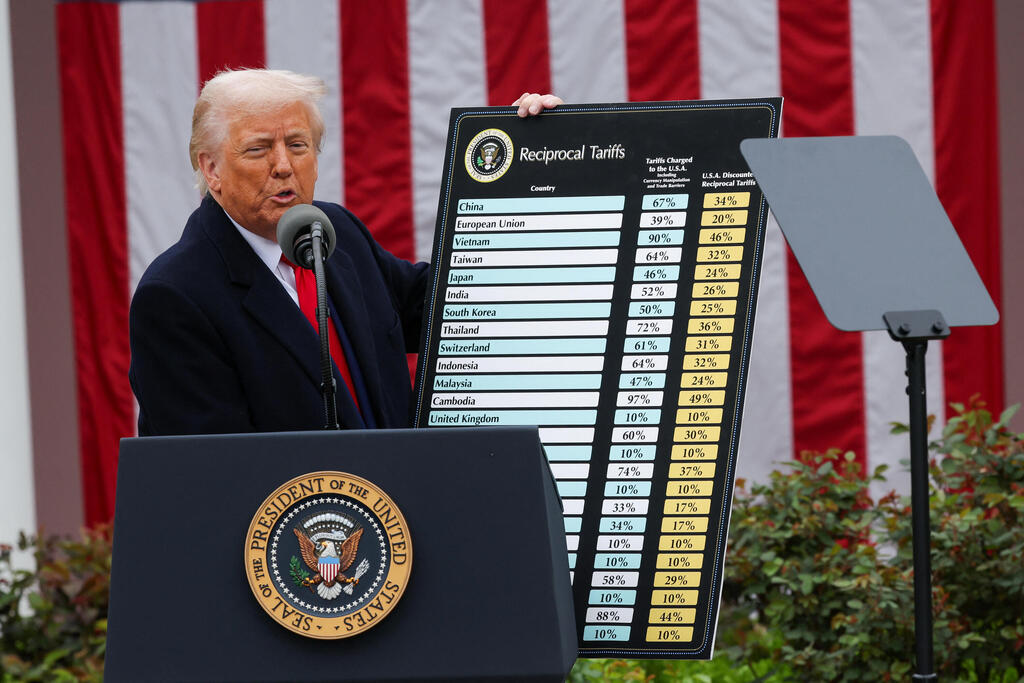Getting your Trinity Audio player ready...
Concerns were raised Friday in the Israeli high-tech industry following the announcement by the Trump administration of a 17% tariff on imports from Israel. The confusion and lack of clarity regarding the scope of the planned tariffs have led industry executives to express fears about damage to Israel's competitiveness, increased production costs, potential relocation of production lines outside Israel, and layoffs.
Alon Ben Zur, Chairman of the Israeli High-Tech Association in the Manufacturers' Association of Israel and CEO of Bynet Data Communications, said: "This is a worrying step that raises deep concerns among Israeli high-tech companies. High-tech is an industry built on cross-border technological collaborations, and the U.S. market is a key target for exports, investments, and joint business activity. The tariffs could harm the competitiveness of Israeli companies and slow down joint investments, particularly in critical fields such as cybersecurity, communications, and advanced components. Such measures could negatively impact long-term collaborations and reduce the volume of foreign investments in Israel."
Shaul Meridor, CFO at the high-tech company Lightricks and former head of the Budget Department at the Ministry of Finance, said in a conversation with Ynet that it is too early to assess the impact of the tariff on Israeli high-tech: "We need to take a breath, see the orders, and understand what they say, assess their impact on companies—if there is any—and only then determine what actions to take. I think that right now, no one fully understands what is going to happen."
Tariffs to affect 10%-15% of high-tech exports
Other senior figures in the Israeli high-tech industry we spoke to preferred not to comment publicly at this stage until the new rules of the game become clear. However, the conflicting assessments we heard from them reflect the magnitude of the confusion and the sense of uncertainty prevailing in the industry at the moment. "Everything depends on what the order says," one of them noted. "In an organized administration, this would have been presented alongside the publication of the order itself, but it will probably be released in the next day or two. Right now, it’s unclear who is included, who gets an exemption, whether there are different tariff rates for different products—there are a million questions."
The prevailing assumption among most involved in the matter is that the new tariffs will not apply to software and applications, such as cybersecurity products or AI, but rather to electronics, medical devices, and the like. Although high-tech exports account for more than half (53%) of Israeli exports, 70% of this is software products. Since only about a third of Israeli high-tech exports are directed to the U.S. market, the tariffs are estimated to affect approximately 10%-15% of high-tech exports from Israel.
One of the central questions troubling high-tech executives is whether an Israeli company with a U.S.-based subsidiary can sell its products through the subsidiary and thus avoid the tariff. One source noted that in the past, the high-tech industry dealt with this issue and found tax and legal solutions along those lines. However, another senior figure pointed out that if the products are manufactured in Israel, they will be subject to tariffs even if sold in the American market by an Israeli company. "My concern is that this could lead Israeli manufacturers to prefer producing products intended for the U.S. market on American soil," he said.
One of the central questions troubling high-tech executives is whether an Israeli company with a U.S.-based subsidiary can sell its products through the subsidiary and thus avoid the tariff
An Israeli government official raised the possibility that the American tariff orders might actually benefit Israeli high-tech exports: "If an Israeli manufacturer competes with an American manufacturer, they are indeed harmed because their product becomes 17% more expensive. However, if the Israeli competes with a European or Asian manufacturer for an American customer, they have an advantage because the tariff on their product is lower than the tariff on the European or Asian product. And in competition for European customers, for example, the Israeli manufacturer is at an advantage over American manufacturers, because we have a free trade agreement with Europe, while Americans face tariffs in Europe. Thus, Israeli manufacturers will have significant advantages."
In the industry, there is no ruling out the possibility that Israeli manufacturers of high-tech products will have to absorb the 17% tariff to maintain their competitive pricing in the American market. "Such a step would hurt their profitability, so companies would have to decide whether to forgo deals or reduce their profitability," said a source we spoke to.
TARIFF WAR
(ILTV)
Another question of concern, particularly to executives at American companies with production operations in Israel, such as Intel Israel and KLA Israel, is whether the products they manufacture in Israel will be subject to U.S. tariffs even though they are American companies. An industry source estimated that such companies, which also have production facilities in the U.S., direct their products from there to the American market, while products manufactured in Israel are sent to other parts of the world. According to one estimate, the new tariffs will not apply to semiconductors (semiconductor products) in any case, so the Israeli semiconductor industry will not be affected.
<< Get the Ynetnews app on your smartphone: Google Play: https://bit.ly/4eJ37pE | Apple App Store: https://bit.ly/3ZL7iNv >>
Vered Kirshner, Head of Israeli and International Taxation at PwC Israel, told Ynet: "At this stage, until matters are finalized, there is a cloud hanging over the local high-tech market. However, in every major crisis or change, there is an opportunity, and I see a relative advantage that the local market can develop. For example, exports from Israel are expected to be cheaper than exports from Europe and the Far East, and companies can leverage this to their benefit."
"At the moment, it seems that the new tariff will not apply to pure software companies, such as SaaS companies, gaming, applications, etc. However, hardware companies are likely to fall under the new tariff, and when software is integrated into hardware, it is currently unclear whether it will be possible to distinguish between the software and hardware. This could result in higher prices for Israeli products," Kirshner noted. "This could make Israeli exports less attractive compared to products manufactured in the U.S."







